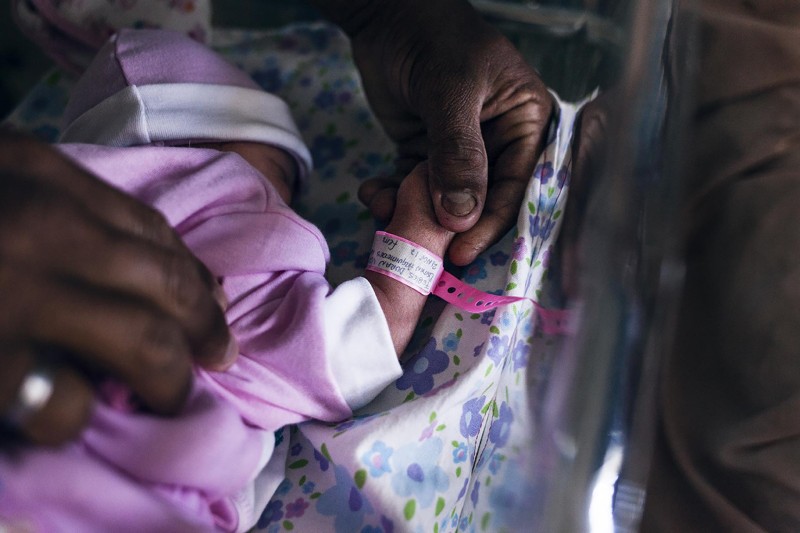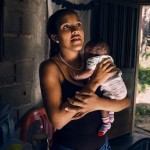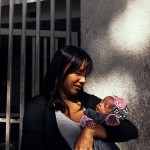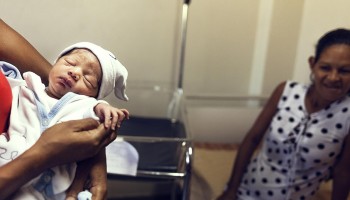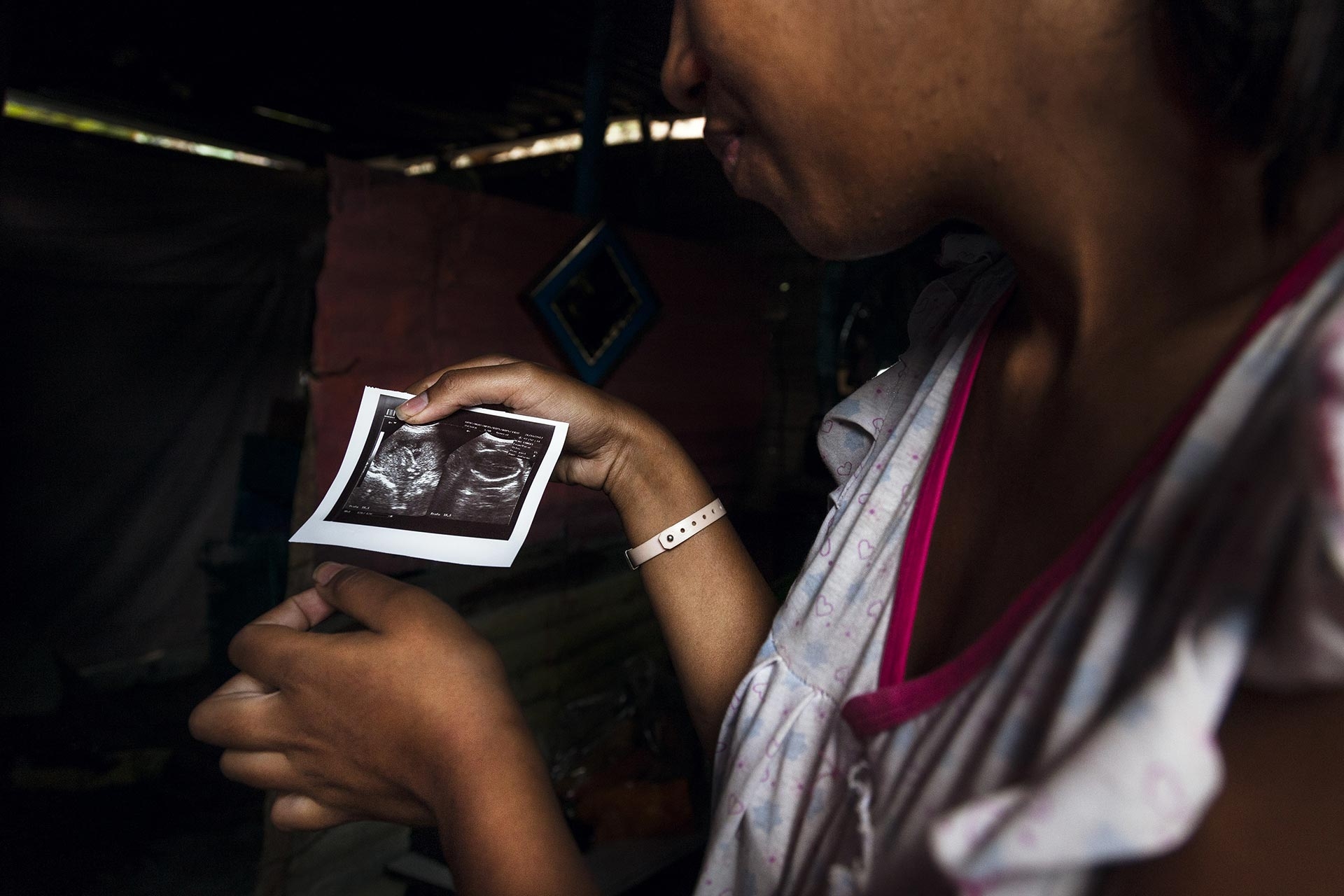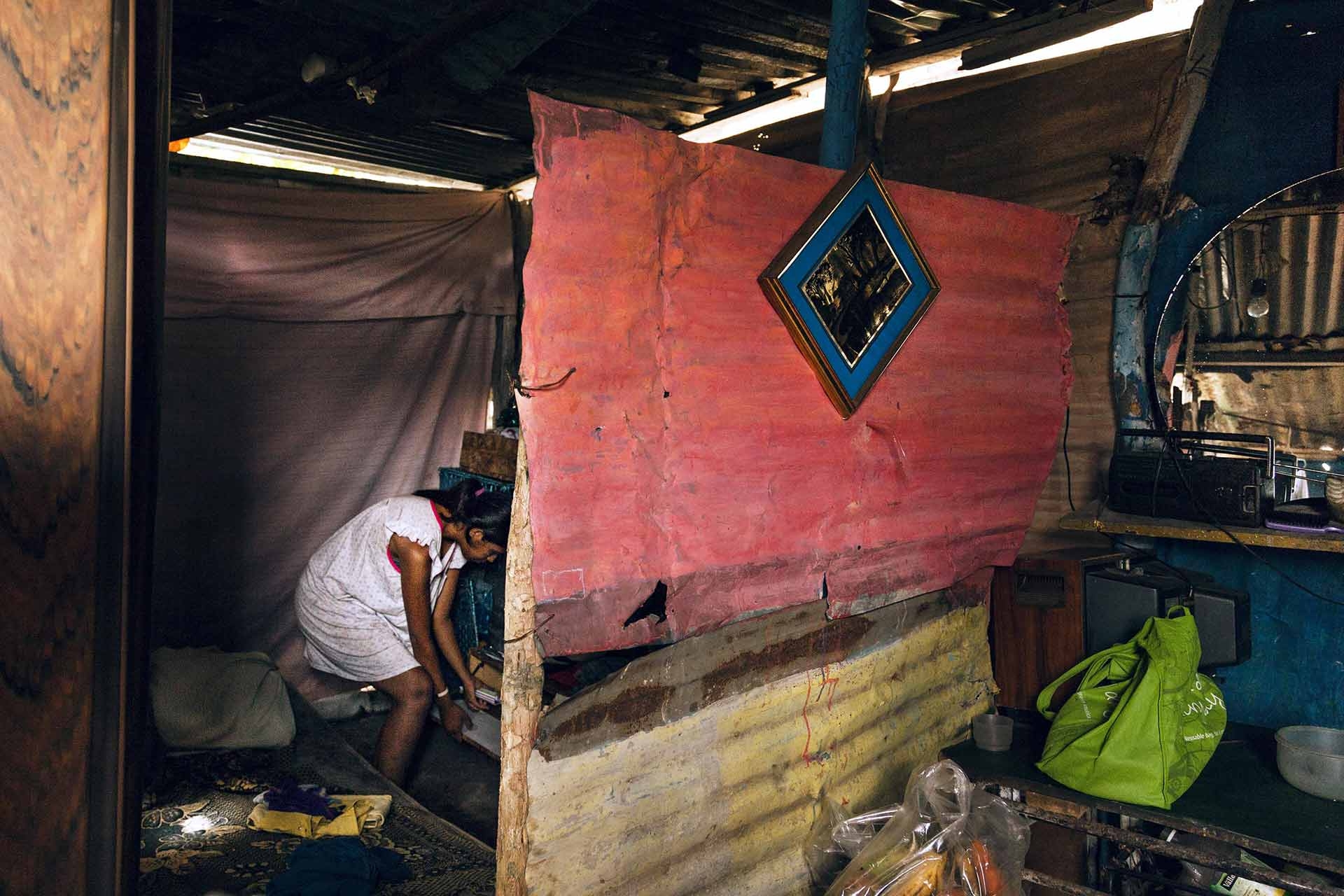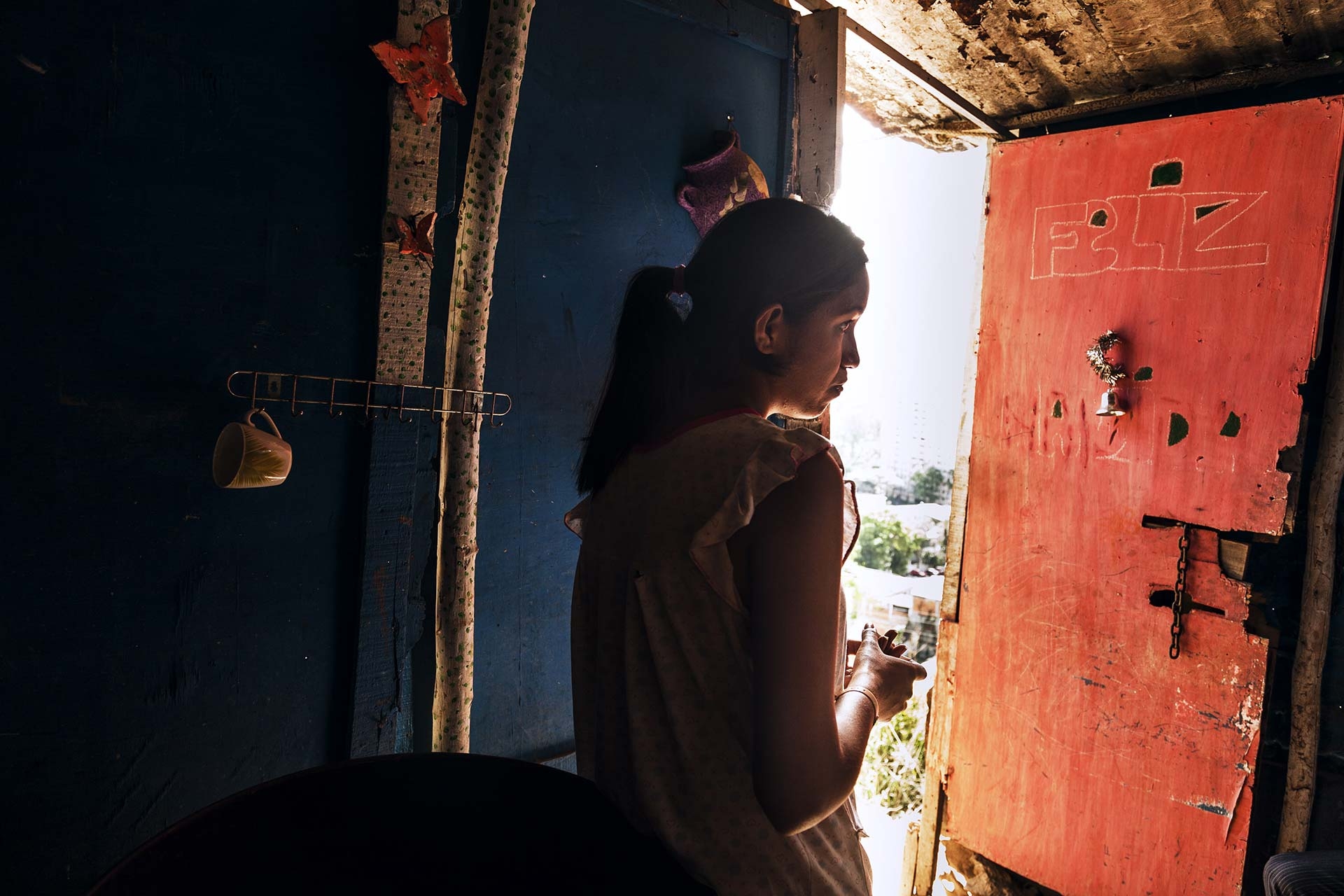She tells her story with emotion, but doesn’t cry. She ran out of tears long ago, after frequent beatings from her partner during pregnancy. She tried to fight back just as hard, but each punch sapped the little strength she had — she was eating just one meal a day.
Lisbeth Perez’s baby was born weighing 2.2 kilograms, about 13 percent under the normal weight established by the World Health Organization (WHO).
Her baby’s condition was complicated by gastroschisis, a birth defect in which the intestines form outside the abdominal wall. The condition’s cause is uncertain, though scientists say it could be genetic, environmental, or related to what the mother eats and drinks during pregnancy. Lismary was born on Dec. 30, 2017. She died ten days later, and her death certificate listed the cause as septic shock. Her lungs “sounded like a truck,” recalls her 25-year-old mother.
Lismary became just another name on the growing list of newborns who have succumbed to illnesses where low birth weight (LBW) could be a factor. The trend is clear: since 2013, Venezuelan babies are now being born thinner, sicklier, and less likely to survive for long.
After prematurity, LBW is the second most common cause of death in newborns, according to Pedro Faneite, a specialist in maternal and fetal medicine. He warns that underweight newborns are up to 30 times more likely to die prematurely than those born with a healthy weight. Low birth weight is often related to infections, malnutrition, infantile paralysis, mental deficiencies, and learning disorders.
Venezuela’s government has tried to keep the true scale of the problem hidden from public view. In some cases, officials have dismissed the existence of hunger in Venezuela. Yet leaked data from two maternity hospitals in the capital of Caracas obtained by reporters from Efecto Cocuyo, a partner of the Organized Crime and Corruption Reporting Project (OCCRP) reveals a grim picture of rising LBW rates.
Since 2013, the wards of Caracas’s Concepcion Palacios Maternity Hospital, one of the most important hospitals in the country, have seen more and more babies born with LBW. The rate accelerated alarmingly in 2016, increasing to 16 percent from 11.6 percent the previous year.
Leaked statistics from the Santa Ana Maternity Hospital, where Lisbeth gave birth, are not much better. The hospital showed a steady increase in LBW: from 11.2 percent in 2015 to 13.1 percent in 2016 and 13.9 percent in 2017.
These leaked statistics reflect painful realities for many Venezuelan families. Babies are born weighing less, among other reasons, because their mothers are literally starving.
Empty Bowls, Empty Words
Lisbeth is convinced that her daughter was born underweight because of the lack of food during her pregnancy.
While she was pregnant, she didn’t eat well. “There were (times) when I would only eat once a day,” she says.
Lisbeth, an employee of the Ministry of Education, confesses that she did not eat lunch with her co-workers because she was ashamed at not being able to bring food to work. She buys the “CLAP” bag — food packets distributed by the government’s Local Supply and Production Committees — which she says mainly contains carbohydrates. But the “CLAP” delivery is not always regular, and Lisbeth hasn’t received one for two months.
Lisbeth is hardly the only Venezuelan who goes hungry. According to the Venezuela Living Conditions Survey for 2017, 64.3 percent of more than 6,000 people surveyed lost 11.4 kg or more in 2017, as a result of shortages and the high cost of food.
Henry Rodriguez, the deputy director of the Ana Teresa de Jesus Ponce Maternity Hospital, attributes the country’s LBW situation to malnourished mothers. As evidence, he cites his own experience in a public health center located in the state of Vargas.
Last November, he saw three babies die at three months, weighing about 3 kg. Babies of that age should weigh between 5.8 and 6.3 kg. “Unfortunately, that's because of the nutritional state of the mother,” concludes Rodriguez, adding that malnourished mothers were delivering full-term babies weighing 2.3 kg.
Ana Gamallo, head of the department of neonatology at the Ana Teresa hospital, says maternal blood tests are also revealing. “Do you know where I’ve seen hunger? In mother’s laboratory [tests]. All of them show high levels of cholesterol, triglycerides, and glucose. You can see protein deficiency, as a carbohydrates-only diet predominates,” she says.
It isn’t getting easier for Venezuela’s poorest to put food on the table. In 2017, inflation is projected to have exceeded 2,400 percent and to rise to about 13,000 percent in 2018, according to the International Monetary Fund. Last December, a Venezuelan family of five needed to earn 61 times the official minimum wage to remain out of poverty, according to the Caracas-based Documentation and Analysis Centre for Workers (CENDA)
In May 2017, then Health Minister Antonieta Caporale published the latest official health statistics. The report revealed that maternal mortality had increased by 66 percent and infant mortality by 30 percent from 2015 to 2016.
After Carporale made the figures public, President Nicolas Maduro fired her the next day.
More Than a Crisis
Lisbeth’s gestures are delicate and her voice soft, in marked contrast with her environment. She lives in a 12-square-meter zinc shack with a dirt floor. It’s sparsely furnished, with a mattress, an old television, and a radio. She has neither drinking water nor a shower or toilet, just a one-square-meter “private” area as a makeshift lavatory, from which human waste is discarded in plastic bags.
Lisbeth’s neighborhood is called “El Esfuerzo” (the Effort), and it is aptly named: Visitors must climb a set of uneven stairs carved out of dirt, a feat which could challenge an acrobat. Lisbeth describes the day she had to crawl down those stairs to attend a prenatal visit. It was raining and she was seven months pregnant.
The previous birth of her son in 2010 was much easier. “All the vitamins were available. I ate very well, the baby was born with a good weight and size. Because back then, the situation was good.”
Lisbeth’s son lives in an apartment with his father, but she tries to see him every day and help with his homework. “He’s more comfortable with his father,” she says,explaining why the child doesn’t live with her. She spends a significant part of her salary on her son’s private school.
In 2016, non-governmental Caritas de Venezuela began an initiative that has shed light on child malnutrition in three of the country’s 23 states: Vargas, Miranda, Zulia, and the Capital District.
Susana Raffalli, an expert in nutrition who leads the aid organization’s research, notes that the child malnutrition situation in Venezuela has surpassed the humanitarian crisis threshold, which is reached when global acute malnutrition (GAM) in children under five exceeds 10 percent.
Once 15 percent of children in a given country or region suffer from GAM, the situation qualifies as an emergency. And that’s just what’s come to pass in Venezuela.
In July 2017, 16.7 percent of Venezuelan children under five years old suffered from GAM.
The country’s humanitarian crisis causes more than hunger; Raffali explains that it takes a toll on wellbeing, dignity, and integrity, causes massive suffering, and can result in the loss of life.
She adds that while a humanitarian crisis could be relieved by the state allocating additional resources, a full-blown emergency requires international assistance.
And while the government in Caracas continues to deny that there is a humanitarian crisis, thousands of Venezuelans are voting with their feet and heading for neighboring countries.
The Doctor is Out
That crisis is not just about food — it’s exacerbated by the general inability of the healthcare system to do its job. Once again, Lisbeth’s story presents a sad example.
Lisbeth was excited to find out she was having a daughter. But her joy disappeared five months into her pregnancy. In October 2017, she found out through an eco-sonogram, that the baby was not developing normally. Part of the small intestine was forming outside her abdominal cavity.
When Lisbeth went into labor, she visited four of Caracas’ main public health centers. Only one could treat her because the others did not have a pediatric surgeon available who could operate on the baby after delivery.
Nor did Lisbeth receive support from the government until it was too late. The state gave her two million bolivars (then around $12.6), which barely covered the cost of the infant’s 20-minute vigil and cremation.
In spite of her hardships, Lisbeth has not lost faith. She sometimes attends Christ, The One Salvation evangelical church in the county of El Valle, where she has found spiritual support and rediscovered her Christian faith.
“God knows why he does what he does. Who knows if it was the best thing for her?” Lisbeth says of her dead child. “Maybe she was going to suffer because of her problem, and since there are no antibiotics, not this, not that, there is nothing in this country,” she adds, trying to make sense of her tragedy.
“Life goes on and I still have to watch my 7-year-old boy grow.”
A call from the World Health Organization
What can the Venezuelan authorities feasibly do to ensure that stories like Lisbeth’s remain the exception to the rule?
Francesco Branca, the director of the WHO’s Department of Nutrition for Health and Development, explained to reporters why dealing with LBW presents such a challenge (See video). The WHO has set a global goal of reducing the number of LBW babies by 30 percent by 2025.

Venezuela, however, has been moving in the wrong direction.
It wasn’t always that way. According to data from the Pan American Health Organization, Venezuela actually reduced the percentage of babies born with LBW from 10.6 percent in 2011 to 7.5 percent in 2013 and and 7.7 percent 2014. But then the trend reversed, rising to 9.2 percent in 2016. During this two-year period, food became more scarcer and prices soared.
However, the Venezuelan government reported that it had supplied free micronutrients such as vitamins and folic acid to pregnant women in 2015. But neither of the 14 mothers and pregnant women interviewed for this article had received these supplements on a regular basis, if at all, during their prenatal check-ups.
When women don’t get those supplements for free, they must buy them. In November 2017, the total cost of a month’s supply of iron, folic acid, and calcium was around 190,000 bolivars (about $3.10), which accounted for 41.6 percent of Venezuela’s minimum wage at the time (456,507 bolivars or $7.49). For the country’s poorest, that’s an unaffordable expense.
To make matters worse for the malnourished and their children, Venezuela has also sharply reduced the amount of protein it imports. The United Nations Comtrade database shows that in 2010, Venezuela spent over $900 million on importing meat, while in 2016 that had dropped to $375 million. The same was true for imports of live animals, which fell during those same six years from $646 million to $17.5 million.
Swept Under the Rug
Ali Barrios is the director of the Concepcion Palacios Maternity Hospital, one of the major Caracas hospitals from which the statistics on LBW babies was leaked in 2017.
In his office is a monitor linked to a video surveillance system, and on his desk, Barrios keeps a sculpture of the late Venezuelan president Hugo Chavez, dressed as a doctor with a stethoscope around his neck.
He seems defensive. “Do you come from a government or an opposition news media?” Barrios asks a reporter for Efecto Cocuyo. He does not allow the conversation to be recorded, evading many questions, and answering others only briefly.
“I am a Chavista and [a member of the United Socialist Party of Venezuela] PSUV. Once, I told Chavez that the director of a hospital had to be social, a humanist, responsible, and knowledgeable and a Chavista.”
He said Chavez responded, “That’s right, comrade! Men like you are needed in the revolution.”
“The level of services provided to low birth weight cases in [this] hospital is normal and expected, because we deal with more premature births,” explained Barrios when asked by reporters why the number of newborns with LBW had increased in his hospital over the last three years. “In total, we treat 12,000 obstetric cases per year. It is a maternity hospital of high complexity. In simple words, I take care of what others don’t.”
When reporters told him they were aware the Concepcion Palacios Maternity hospital did not provide micronutrients required by pregnant women free of charge, Barrios responded simply that they “had folic acid and iron… They don’t need anything else.”
Reporters then asked Barrios whether the increase in LBW was related to pregnant women’s poor nutrition. “Venezuelans are now eating better” he explained, “because they now know what they eat.”
“And now, they don’t drink soda.”
